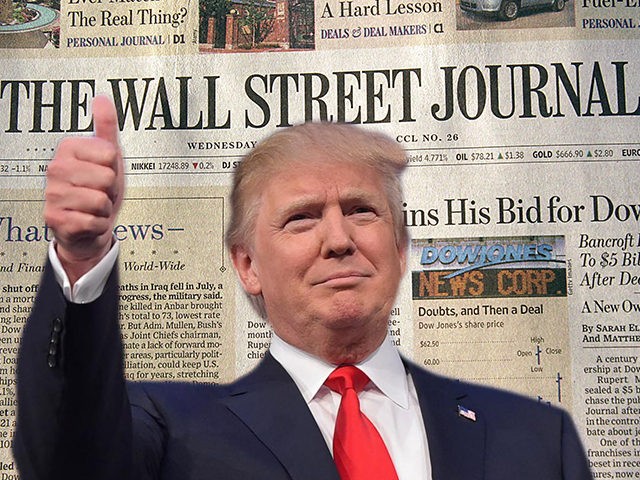Eliana Johnson details in Politico magazine how the rise of Donald Trump caused “an identity crisis” for the once venerable arbiters of conservatism on the Wall Street Journal editorial board. Trump’s populism and economic nationalism clashed with the Journal’s globalist open borders and free market absolutism, and his election to the presidency ultimately relegated the Journal’s anti-Trump conservative pundits to the “sidelines” of political influence.
From Politico:
[Trump’s nomination and election] created an identity crisis for traditional conservative media outlets like the Wall Street Journal. With its hallmark support for “free markets and free people,” the Journal editorial page was among the least likely in the constellation of conservative media outlets—ideologically speaking—to find comity with Trump’s populist message. In fact, his election was in many ways a rejection of the worldview championed by the paper’s editors, which includes a devotion to free trade and an open-borders immigration policy.
Covering Trump’s candidacy, and now his presidency, has become the subject of fierce debate among the editorial staff, according to several sources, producing deep internal divisions that reached a boiling point in mid-April, when Bret Stephens, the Journal’s deputy editorial page editor, announced his departure for the New York Times. Stephens’ exit capped months of bitter feuding that had already driven out a handful of other employees. Inside the Journal’s headquarters on Sixth Avenue in New York, the editorial board had formed rival camps: one, more friendly to Trump, led by editorial page editor Paul Gigot, and the other, more critical of the president, led until recently by Stephens.
Two Journal sources say Stephens’ relentless anti-Trumpism produced a “cold war” between him and Gigot, and that by the time of Stephens’ departure, the two barely spoke to each other. Stephens had once been a regular fixture on the “Journal Editorial Report,” the Fox News show featuring Gigot, and a panel of his editorial page colleagues, but he rarely appeared on the air after Trump seized the nomination. Asked about the interpersonal tensions sparked by Trump’s candidacy, both Gigot and Stephens declined to comment.
…
But resistance to the increasingly Trump-friendly tone of the editorial page led to personnel changes. After the election, Gigot fired the Journal’s editorial features editor, Mark Lasswell, after the two clashed over the amount of pro-Trump content that should be featured on the page, according to a report in the Atlantic. (Days later, Lasswell circulated the Atlantic report to his contacts to announce his departure.) The paper’s longtime books editor, Robert Messenger, left for the Weekly Standard, one of the leading anti-Trump publications on the right, in March.
…
For much of recent political history, this kind of feuding at an elite venue like the Journal would have been a titanic battle—a proxy war for the soul of the GOP. Today, it is more of a sideshow. During the campaign, Trump attacked by name some of the conservative intellectuals—such as Charles Krauthammer and George Will—whose approval was most valued by previous Republican presidents, from Reagan to George W. Bush. It hurt Trump not at all. Now, his White House contains few conservatives and few intellectuals, and his election effectively relegated the class of journalists represented by the Journal editors, who once enjoyed enormous influence over politics and government, to the sidelines.
Read the rest here.

COMMENTS
Please let us know if you're having issues with commenting.